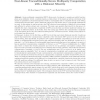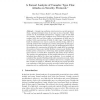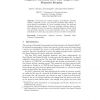719 search results - page 40 / 144 » Proving Security Protocols Correct |
116
click to vote
IACR
2011
13 years 10 months ago
2011
Secure multiparty computation (MPC) allows a set of n players to compute any public function, given as an arithmetic circuit, on private inputs, so that privacy of the inputs as we...
AMAST
2008
Springer
15 years 1 months ago
2008
Springer
A simple type confusion attack occurs in a security protocol, when a principal interprets data of one type as data of another. These attacks can be successfully prevented by \taggi...
101
click to vote
CORR
2010
Springer
14 years 11 months ago
2010
Springer
Abstract. In this paper, we present a protocol for computing the principal eigenvector of a collection of data matrices belonging to multiple semi-honest parties with privacy const...
EUROCRYPT
2006
Springer
15 years 2 months ago
2006
Springer
We present the currently simplest, most efficient, optimally resilient, adaptively secure, and proactive threshold RSA scheme. A main technical contribution is a new rewinding stra...
EUROCRYPT
2005
Springer
15 years 4 months ago
2005
Springer
It is a standard result in the theory of quantum error-correcting codes that no code of length n can fix more than n/4 arbitrary errors, regardless of the dimension of the coding ...



